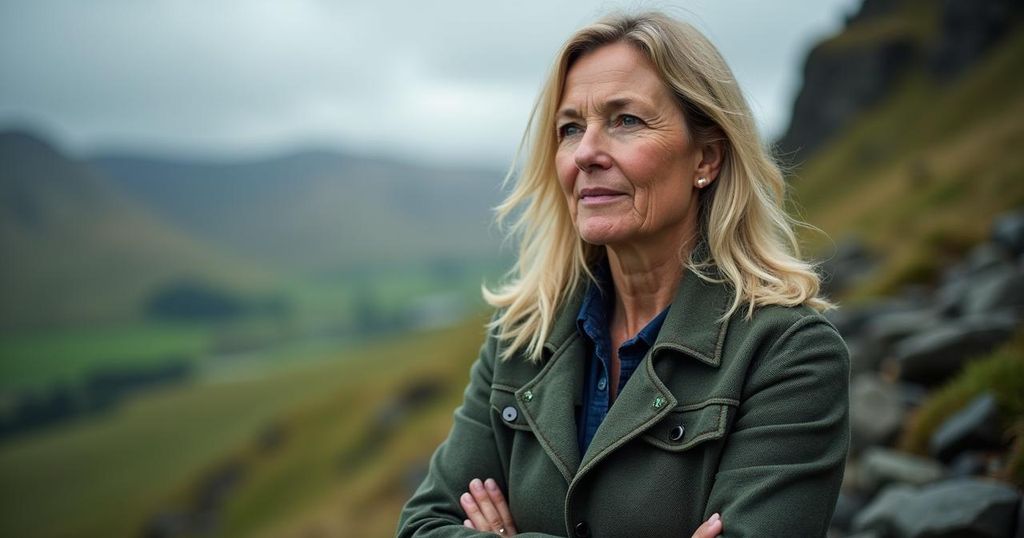Professor Karen Wiltshire emphasizes the urgent need for innovative solutions to combat climate change effects in Ireland, including rising sea levels and extreme weather. Trinity College Dublin is actively engaged in research and education aimed at reducing emissions and implementing climate solutions as part of national objectives.
Professor Karen Wiltshire discussed the pressing issues concerning climate change in Ireland, emphasizing the vital statistics symbolized by the Irish climate stripes—a visual representation of the change in air temperature over time, crafted by Professor Ed Hawkins of the University of Reading. The data comes from sources such as Berkeley Earth and ERA5-Land. Climate change presently stands as the foremost global challenge, causing significant societal upheaval, resource depletion, and biodiversity loss. Ireland, characterized by its relatively small geographical size and proximity to a warming ocean, confronts some of the most severe effects of climate change in Europe, including the highest rates of sea level rise and unpredictable weather patterns. With approximately 50% of its population residing near coastal areas, the nation urgently requires innovative solutions to develop future coastal cities and infrastructure, given that its economy heavily relies on maritime logistics, with 99% of Irish trade transported via sea. Despite Ireland’s high per capita carbon footprint, characterized by dependence on automobiles and energy-intensive industries, the nation is committed to addressing the challenges posed by carbon emissions. This commitment extends not only to its own population but also to supporting vulnerable regions, such as Small Island Developing Nations and tropical Africa, in securing sustainable futures. At Trinity College Dublin, where Professor Wiltshire serves as Chair of Climate Science, there is a dedicated commitment to fostering climate solutions through research and education. Efforts include investigating the potential of Irish boglands as carbon sinks, developing environmentally friendly construction materials, and enhancing drinking water quality amid increased flooding risks. Collaborations with scientists and engineers aim to create nature-based solutions to adapt to rising sea levels and understand climate-related health impacts. Trinity’s objectives align with national goals, such as the Climate Action Plan requiring a 51% reduction in greenhouse gas emissions by 2030, and a university goal to achieve net-zero emissions by 2040. Furthermore, Trinity is engaged in conserving and restoring at least 30% of its land area for environmental purposes, fostering a cultural shift towards recognizing the interconnectedness of ecological and human health. As part of these initiatives, Trinity will showcase the Irish climate stripes each year during Climate and Biodiversity Action Week, reflecting its commitment to climate awareness and action. This initiative is made possible through collaborations with various governmental and research bodies, which promote excellence and broad impact in addressing climate challenges. Title: Addressing Climate Change in Ireland: Insights from Professor Karen Wiltshire Fast Summary: Professor Karen Wiltshire highlights the critical impacts of climate change in Ireland, emphasizing the necessity for innovative solutions due to rising sea levels and extreme weather. Trinity College Dublin is actively engaged in research and initiatives to mitigate these challenges while committing to significant emissions reductions as outlined in national policies. Background: The concept of climate stripes, developed by Professor Ed Hawkins, serves as a visual representation of climate change, illustrating temperature variations over time. Ireland’s specific vulnerabilities stem from its geographical and economic reliance on maritime infrastructure, requiring immediate adaptation strategies to combat environmental challenges. The interconnectedness of global climate issues necessitates collective action and innovative approaches at local and international levels. Quotes: “Climate change is the biggest global challenge we humans currently face.” – Professor Karen Wiltshire Proof to Links: – [Trinity College Dublin Sustainability Events Calendar](https://www.tcd.ie) Conclusion: Professor Karen Wiltshire’s insights underscore the urgency of addressing climate change in Ireland, particularly given the nation’s unique environmental challenges. Trinity College Dublin’s proactive approach in research, sustainability, and collaboration sets an example for implementing effective climate solutions. The ongoing commitment to reducing carbon emissions, alongside initiatives like the Irish climate stripes, further reflects a stance towards fostering a resilient and sustainable future for Ireland.
The topic of climate change is increasingly recognized as a critical issue requiring immediate and collaborative action. Ireland’s geographical position makes it particularly vulnerable to climate impacts such as rising sea levels and unpredictable weather patterns. This situation necessitates innovative approaches in urban and coastal planning, as well as dedicated research and education initiatives to mitigate the effects of climate change. Individual institutions, such as Trinity College Dublin, play a vital role in driving solutions and fostering awareness among the public and relevant stakeholders.
In summary, addressing climate change in Ireland is paramount due to the severe implications for both the environment and society. Professor Wiltshire’s remarks highlight the importance of collaborative and innovative strategies in research and education, reinforcing the commitment of institutions like Trinity College Dublin. Through targeted actions and awareness campaigns, such as the climate stripes initiative, Ireland can work toward a sustainable and resilient future that aligns with national and global climate goals.
Original Source: www.tcd.ie






